SUNDAY PROFILE: Social Change Agent Tony Davies CEO of Social Futures
Kate Coxall
29 October 2022, 3:40 AM

Tony Davies started with Social Futures, a leading community service organisation across NSW, by working out of the pantry cupboard in a Lismore house when burnt orange and flocked wallpaper were the style fast-becoming retro in its early years, post-Whitlam Government era.
From its humble beginnings, Social Futures today delivers an incredible array of services and programs to those who are most vulnerable, and works to support those not just in crisis, but with early-intervention and advocacy, so that our community may be stronger, for longer. His goal is to see his organisation in Human Services to be far lessened, or in an ideal world, obsolete, as should be the goal of any support service targeting those in areas such as homelessness, domestic violence services and crisis support, but for now, as the need is in fact growing exponentially, he leads a fast-growing, incredible team of social change agents and community workers to hold us in our recovery, and beyond. Here is his story:
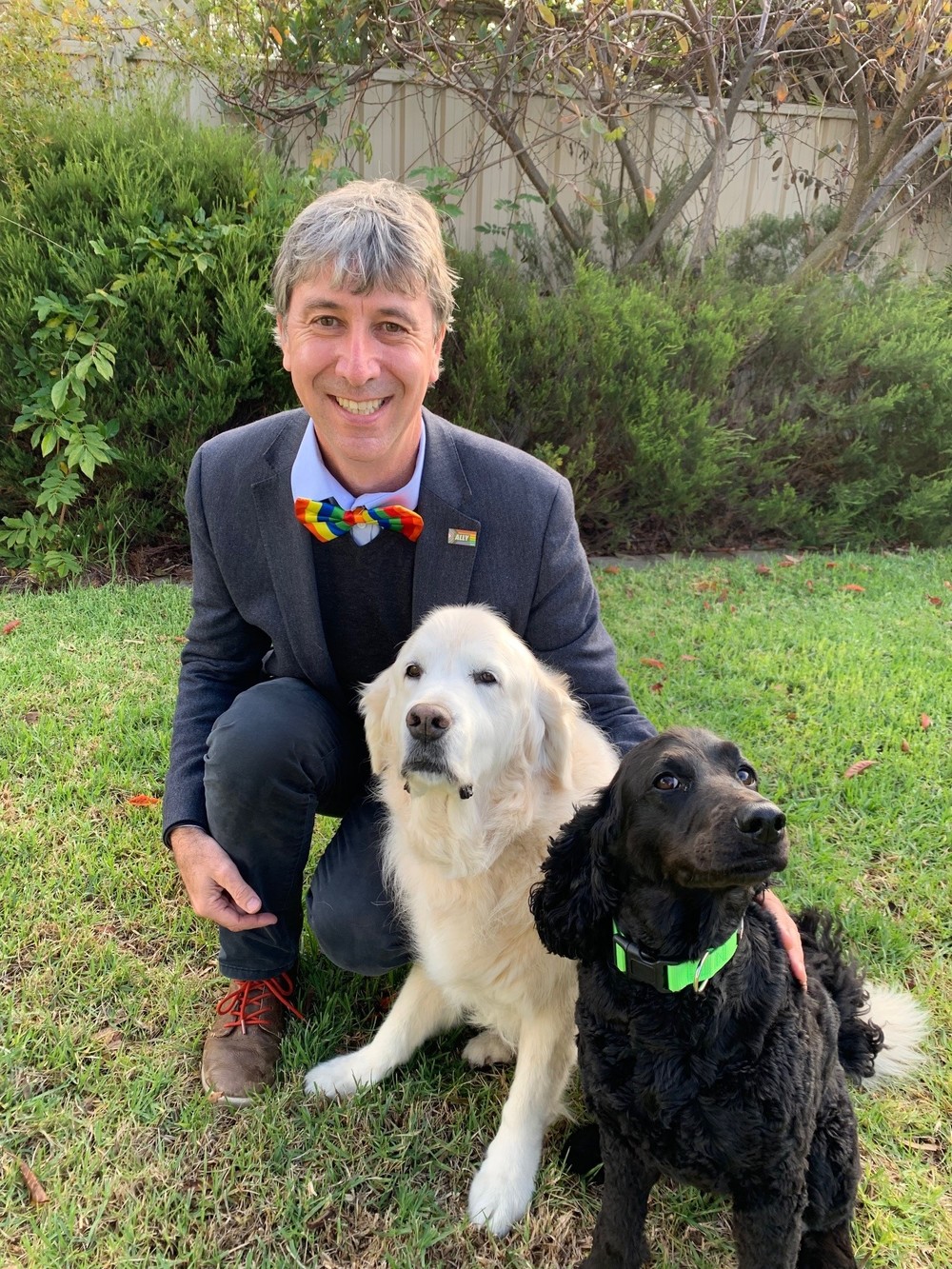
Image supplied: Tony and beloved dogs Walter & Banjo
"I was born in Sydney in Paddington.
I've got one brother and one sister. They're both older than me. James and Mischke.
We went to school in Sydney, but also we spent some of our childhood in Fiji because my father was working for the United Nations on a development project, an educational development program. So, I also lived there for a couple of years went to an international school in Fiji. It was in the 1970s, Fiji had recently become an independent country and there was a need, as part of the Pacific for a focus on ensuring educational development in the region. The thing that I really picked up from living in Fiji was just the amazing culture of Pacific people.
My great ambition as a child was to become a Fijian, which I declared to my parents and I'd spend all my time out in the sun trying to get my skin as dark as possible. My mother would insist that I would wear this fancy sunscreen that they had to import from Australia.
We would go out on boats and camp out on islands, things like that, go snorkelling and see coral. It was a fantastic time to be honest. The Fijian people have a beautiful culture, very welcoming, with a really strong focus on children, family and generosity; incredible generosity of spirit.
It was very different to the country we know as Fiji today. The roads weren't sealed. It took us a week to drive a car around the main island. You can do it in a couple of hours now. When we would travel along rivers in the boat and along some canals, people would invite us to come and stay at their village and while they didn't have a lot of material wealth they were willing to share whatever they had, which is really beautiful!
I was in middle-primary school when I came back. I was quite young coming back to Australia. That was a bit of a culture shock to come back, and to go back into the system of schooling etc here.
My parents always had been fairly progressive in outlook, our part of the generation that had grown up in the postwar, conservative times and absolutely rejoiced you know, at the opening up of progressive policies and all that came with that, in the early 70s in Australia.
They were part of the whole movement around getting education out, on contributing to community, not having racial biases in their approach. In part, my mother's family were Lebanese people who come to Australia in the late 19th century in the 1890s and settled in Grafton. My mother was, my grandmother was, and back in the 1960s Lebanese people were considered by some, to be 'black relatives on the other side' of the family.
One great grandmother on one side of the family wouldn't have the great-grandmother on the other side in their house. It's terrible, isn't it? It was also time Catholic and Protestant division and all of that.
The polarisation that Australia had in the 1950s and 60s, which I think my parents absolutely wanted to move on from and they had, like many people in those days, including those that established the the counterculture on the far north coast, they had a vision that things could be done differently. So we were obviously brought up in that environment, progressives or progressive ideas.
I went to primary school and then high school in Sydney. I went to a state school, Ku-ring-ai High School in Sydney but my parents had always had a connection to the area through my mother's side. Grafton was always this place that my grandparents were visiting. To us it was this mythical place in the distant north.
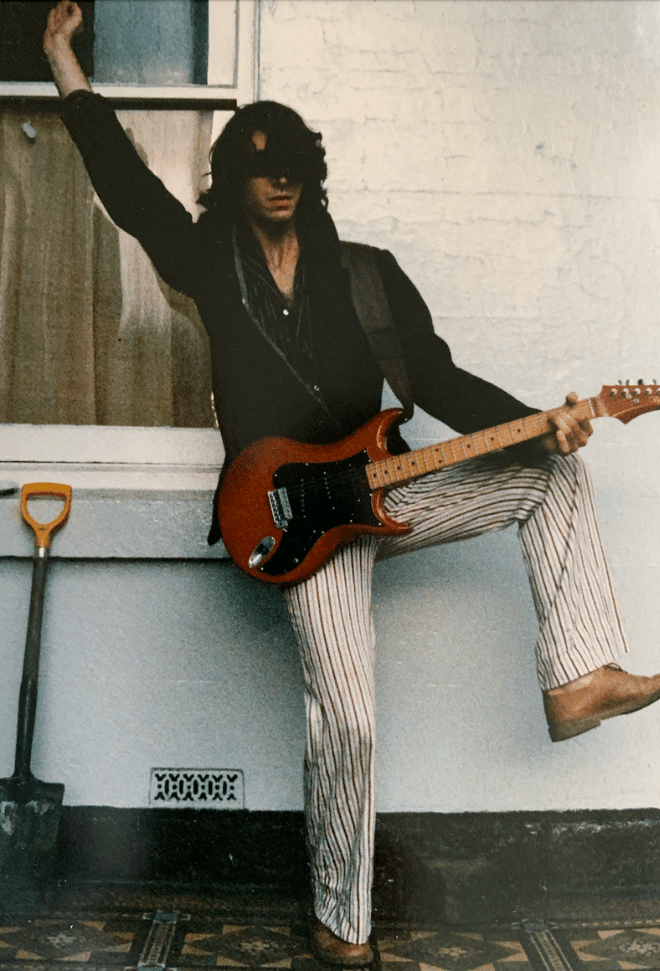
Image supplied: Tony rocking it out
My parents had friends who moved up here and again as part of the post-Aquarius movement, bought properties up in the Tweed Valley. So my parents then bought a house in Kyogle. My mother moved up here, my father was a teacher in Sydney, and he was trying to get a transfer.
My mum opened the first One Hour Photo shop in the region.
I used to be here in school holidays, my first job was at "Quick As A Flash Photos" in the small Lismore Square. We're talking the early 1980s. Basically, people brought us film and it was quite an innovation that you could get your photos back in an hour.
The Lismore square had just opened, it was about half the size that it is now. We used to have Santa there. They had a Nativity scene every Summer that had live animals, live sheep. I remember the air conditioning used to break down and then you could really smell the live sheep! It would be really hot.
So, they were the days. I also remember a farmer coming in once, and putting his film down on the counter he said "can you develop this" and I said "yes, and when do you want it?" he said "a week or two would be fine", so I said "we can do it in an hour for you if you like" the Farmer then said "I don't want it that quick" and he picked it up and left because it was too fast!" (Tony laughs).
Unfortunately, then Mum got cancer and couldn't get treatment here. My dad hadn't been able to get a transfer up as a teacher, so she essentially had to move back to Sydney for treatment. So we sold the business and moved back. But kept the house in Kyogle. So we were always up here going to Kyogle every Summer.
My sister then moved into the house, so there was always that connection.
I went to uni, got a law degree and started working. I worked for a Community Legal Center for awhile, the Australian Law Reform Commission, the state ombudsman and I've even worked in Government law.
Then I got a job in State Parliament as the director of the New South Wales Standing Committee on Social Issues.
I had this choice where I was offered that job and I was also offered a job working in mergers and acquisitions in government. I knew that working in mergers and acquisitions would be incredibly lucrative, but the type of issues that the Social Issues Committee was looking at, at the time were really fundamental; things like the first recognition of the property of same-sex defacto relationships, the effects of past adoption practices etc.
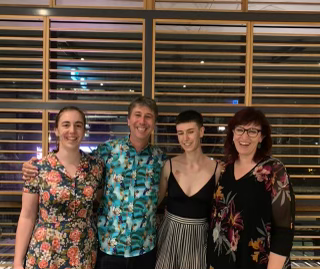
Image supplied: Tony with wife Sally, and daughters Caitlin and Lucy
Really, really fascinating stuff, so that job was an insecure maternity leave backfill job vs a permanent job, a secure job working in mergers and acquisitions, but I was just far more interested in the social issues side. I got that job and worked there for 5 years.
I learned so much about social policy, as when you went to the parliament in the committee system, you're completely neutral, but you do get to meet politicians, all types, and get to understand how the political system works. What I learned there really, is that it doesn't matter which side you come from, what really counts is who you are as a person when you're in politics.
Yes, there are party affiliations, but probably the more important thing, and the thing that I always took from that is: there might be people who are in parties that you may never vote for, but they're really nice people that you can always find a point of common agreement and those really great people that I worked with from all sides, were completely across the spectrum.
We were able to look at all sorts of things, you know, censorship of the internet, disability services, community housing, which has so many things that you're able to look at. It was interesting to see, as well, with how the politicians worked across these issues. There were a couple of exceptions, but to be honest, most of them worked so hard, and they were really doing their best. I don't think people see that side of it, it's really hard work.
We were part of a team and, you know, we were supporting politicians and they would ultimately make the decisions but a few wins I recall and feel proud to have been a part of:
One of them was recommending that the government apologise to people for the effect of past adoption practices. That recommendation was made in the late 1990s. Julia Gillard made that apology, 12 years later.
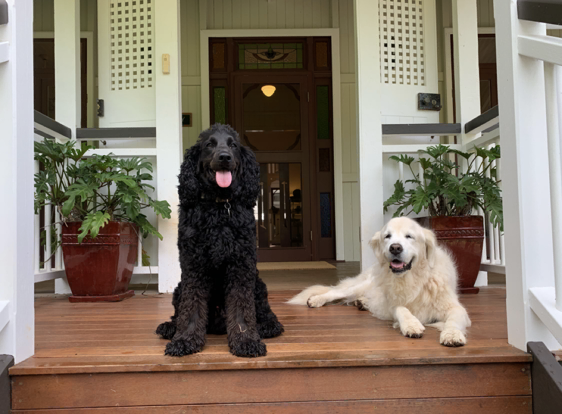
Image supplied: The family four-legged's- Walter and Banjo proudly guarding home
The committee that I worked for was the first government body to officially recommend that apology. I'm sure there were many others, afterwards. But I do think the team that worked on that certainly helped create that movement.
The other, was that the disability and child protection areas. We certainly contributed to a push to get a lot more resources into those parts of the system.
Disability I think, some of the work that we did, helped convince senior people in the government to push for far more in the sector and it was part, a small part but part, of the impetus that ultimately helped lead to the social movement that created the NDIS. But I do have to say it was a modest contribution in reality.
That's how politics works, it is a marathon and it does take time and each little bit to create movement along the pathway ends up getting the result, it's that continued pressure and that continued conversation, and keeping things in the conversation that does make the difference.
Child protection was a system that was struggling and it does continue to struggle but we we drafted a report and once released, a fortnight later the NSW State Government responded with a $1.2 billion boost in funding available. There were a number of factors that lead to this, the state government had a very sound bottom line, there was an election coming up, and a parliamentary committee report and they had also just appointed a really effective and strong minister who then went on to become Deputy Premier.
But we've certainly felt that with the process of holding an inquiry in Parliament, means you'll be shining a light on an issue, it's that light and making a government uncomfortable, then that does help to protect.
The company I worked for actually had a majority of government employees. So they had to, if they wanted the issue fixed.
They also had members of the opposition on the committee, that also wanted the issues fixed. So they had to be very courageous in how they would balance this need.
To back their side of politics but also actually get that change happening. It's applying enough pressure to get a result without applying so much that they shut you down. Which is the skill really, of politics. That's the game.
Janelle Saffin was there at the same time, when I went into parliament house. So after that we had this big inquiry into child protection services. There was a massive injection of funding into the department to really try and make a change. So, I then went across to government and started working in the Child Protection Department to help drive that change.
But at the same time, we had a young family and the hours that were required were extraordinary. I had a seven day a week job. I was director of prevention and early intervention at what was then called the Department of Child Services (DOCS).
It was a great job and a great opportunity but with two young children, working in a job was all about supporting parents and supporting people to be more effective parents, and I don't think I was personally doing a great job at that. So it wasn't good for my family.
My wife Sally Robinson and I both love the Northern Rivers and always wanted to come back. We'd spend as much time as we could in Kyogle but we couldn't ever work out how we could get the job in the region, how we could make that move.
Then a job came up! It was a frontline community role, working on a project called Communities for Children which the YWCA run, and still run to this day.
I applied for that job and was lucky enough to get it so we were able to move up.
Caitlin and Lucy were still young, Kindergarten and Year 2, we initially moved to Macleans Ridges and then, we bought a house we just recently sold, in Dorroughby. The kids went to school in Clunes and despite doing what so many young people in the region do, they moved away to cities to study and work, during the floods, they came straight back as soon as they could, saying "Lismore is our home."
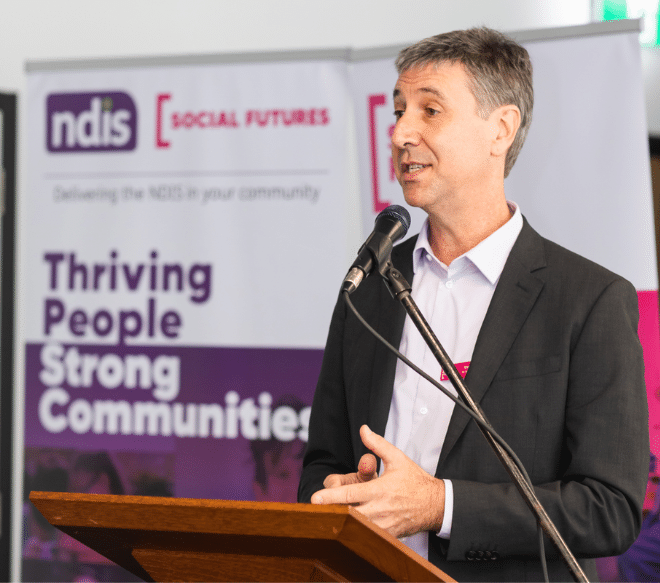
Image supplied: Tony at the new Social Futures office opening, in the Westlawn Building on Molesworth St.
Both girls, now in their early 20's and Sally and I, were all here during that time, as were thousands of people who took time off work, to travel up and pitch in. We loved living in Dorroughby, but due to Sally getting a position at Flinders University in South Australia as Professor of inclusion, disability and social inclusion, and the girls not living at home, and the travel I undertake for work, as Social Futures covers much of the state of NSW now, we felt that this beautiful family home, which had done us so well, should go to a young family who need the space.
We are living between South Australia and bought a unit in Tweed Heads, which is near the Social Futures Tweed office.
2/3 of our Social Futures people are in the Northern Rivers, but we do have offices in Coffs, the Hawkesbury, and even out in the Western parts of the State. So many of our people lost their homes during the floods, some lost them during the fires in 2019, and they still haven't been rebuilt. I've spoken on thus in inquiries and events on their behalf and have found it an incredibly emotional thing to do. We weren't impacted, but our friends were, they had near death experiences, so many of them.
Since the floods, and really, since the pandemic, housing and homelessness as well as Domestic Violence support services have seen a huge increase in need, that is just absolutely beyond crisis point. We need the government to start building, we know its a slow process, but to start building social housing, in our area which has often been overlooked and not received it's fair share of social housing funding, even if it takes 100 families of that 18,600 (that need social and affordable housing in our region), off the streets and out of these destructive conditions, which have such a huge impact on their lives, their mental health, then it will start to make a huge difference. It just needs to begin."
Social Futures now proudly, delivers a support program specifically catered to those who have been flood affected, so they don't need to keep re-telling their traumatic story, so they can rest assured they have a team in their corner, to support their recovery, across the range of services available. You can read about that here: Social Futures launch new support service for flood affected people

